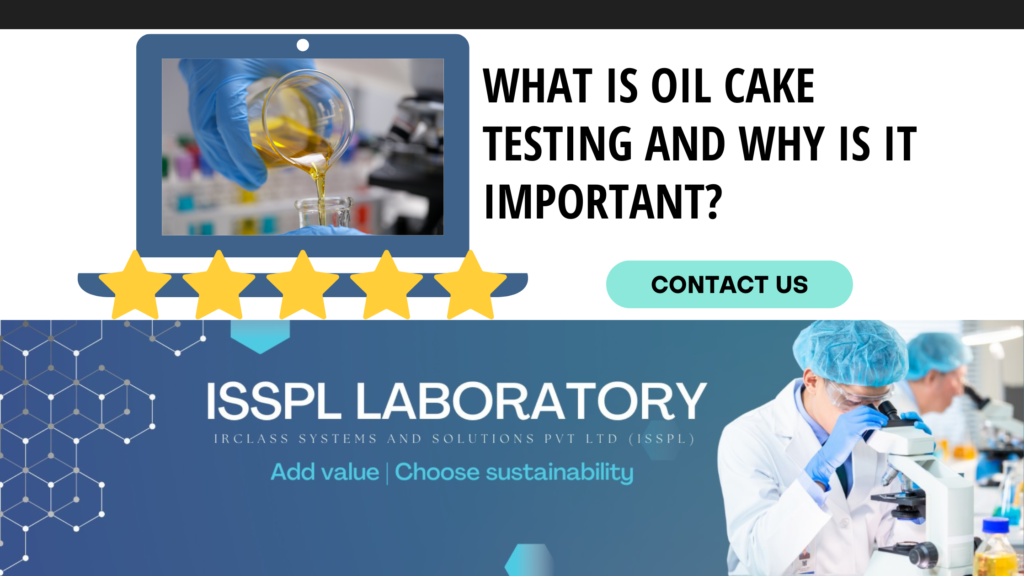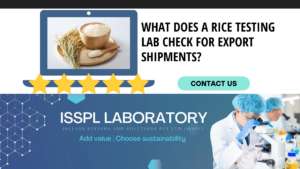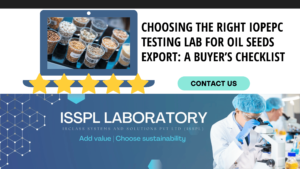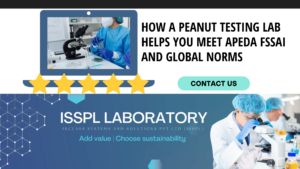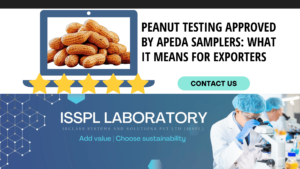An Overview by Team ISSPL - Analytical Testing Laboratory in India
ToggleOil cakes or press cakes are the solid residues which are left behind after the extraction of oil from seeds and nuts. They are crude products of oil extraction and are popular for their nutritional value, for instance as a source of protein in feeds.
The common oil cakes include soybean meal, peanut cake, sunflower cake and cotton seed cake. Some of them are used in farming, food industries and even as fertilizers in the farming processes.
However, the demerits of oil cakes are rare compared to the advantages that accompany it. Therefore, it is wise to have the safety, quality and nutritional values of the oil cakes examined. This is where oil cake testing comes in handy.
Oil cake analysis includes the evaluation of the content, nutrients and risks that may exist in these products before they reach the market. Now that we have looked at the need for oil cake testing let us look at the importance of the testing procedure in various fields.
What is Oil Cake Testing?
Oil cake analysis is the assessment of the chemical, nutritional and safety qualities of oil cakes. The aim of carrying out this testing is, first of all, to ascertain whether or not the oil cakes are suitable for the intended use which may be as feed for animals, manure or for being used as materials for other products.
This testing encompasses diverse scientific methodologies and methods to identify other features of food items, including protein and fat soluble, water availability, and pesticides, heavy metals, and microorganisms.
This situation shows that producers and suppliers can be able to ensure the quality and safety of the oil cake products if they put the products through a strict test.
Why is Oil Cake Testing Important?
Oil cakes find a wide application in the agricultural and food chain business. Therefore, the quality and safety of these cakes are of paramount significance. Here are the main reasons why oil cake testing is essential:
- Assessing Nutritional Value
Oil cakes are proteinaceous in nature containing fiber and vital minerals and therefore are a good feed to give to the livestock. Testing helps evaluate the precise nutritional composition of the oil cake, including:
- Protein that is essential in the development of animal tissues.
- Fat levels, which provide energy.
- Soluble fiber which helps in digestion in animals.
From these components it is possible for the producers to manage the nutrition of the livestock.
- Ensuring Safety
Oil cakes can sometimes contain harmful substances such as:
- Pesticide Residues: Remains of the pesticides used during oilseeds production may be present in the oil cakes.
- Heavy Metals: Lead, cadmium, arsenic or any other similar heavy metal pollution may be due to the environment.
- Microbial Contamination: It can also be infested with bacteria, moulds and fungi if the oil cakes are not well stored.
These contaminants are determined from the food tests and confirm the fitness of the oil cakes for use either as animal feed or for other uses.
- Maintaining Quality
It is also important to note that there is the possibility of oil cakes’ quality to be lowered by issues like poor storage, high moisture content, and high free fatty acid level. It has also been argued that frequent testing helps the oil cake in achieving the desired qualities, hence improving its stability for use.
- Detecting Adulteration
The issue of adulteration is ever rife in agricultural by-products, especially the oil cakes. There are times when some suppliers include poor quality materials or even what may be referred to as fillers in oil cakes with an aim of reducing costs. Tests are made during testing in order to ensure that the product is genuine and not infected with counterfeits.
- Regulatory Compliance
Some of these countries have put in place very rigid regulations on the use of oil cakes, particularly when the substance is to be used in feeding the animals. They are permitted because the BHA rules limit contaminants and because they establish the guidelines for the display of nutrient information. Testing aids in the provision of compliance with the local and international laws that would otherwise lead to legal issues in fair trade.
- Protecting Animal and Human Health
Effects of using contaminated or low-quality oil cakes are growth problems, diseases, or in severe cases, death in livestock animals. This in turn can affect the safety of animal-derived products like milk, meat and eggs. In this way, testing also serves to protect the health of the people to some extent, which is because the safety of oil cakes has been guaranteed.

Common Tests Conducted on Oil Cakes
Several tests are performed to assess the quality, non-toxicity and nutritional value of oil cakes. These tests provide information on the features in the product and ensure compliance to certain features. Here are some of the most common tests:
- Proximate Analysis
Proximate analysis determines the basic nutritional composition of oil cakes, including:
- Moisture Content: Microbes thrive in high humidity, hence making food spoil.
- Crude Protein: A key indicator of the nutritional value of the oil cake.
- Crude Fat: Stands for the quantity of oil that remains stuck in the cake.
- Crude Fiber: Illustrates the fiber level that is useful in the digestion process of animals.
- Ash Content: Stands for the total mineral content in the oil cake.
- Acid Value Test
This test identifies the quantity of FFA in the oil cake and hence the quality of the oil cake and period of its shelf life. High FFA levels may be due to either spoilage or rancidity of the oil.
- Iodine Value Test
The iodine value test shows the amount of unsaturation of the fats that are still in the oil cake. It is used as one of the factors to measure the quality and reliability of the product on the market.
- Contaminant Screening
Identification of contaminants is crucial in determining the safety of oil cakes. Common contaminants tested include:
- Pesticides: Residues from farming practices.
- Heavy Metals: Lead, cadmium, arsenic, and mercury.
- Aflatoxins: Some mycotoxins produced from molds which could grow on oil seeds and by-products.
- Microbiological Testing
Bacterial analysis identifies pathogenic bacteria, molds, and yeasts which are unfavorable to the safety of oil cakes. Common tests include:
- Total plate count.
- Detection of Salmonella, E. coli, and other pathogens.
- Physical and Sensory Analysis
These tests measure qualities of the oil cake that embrace texture, color, and odor that go a long way in establishing the period of production of the cake and its qualities.
The Role of Testing Laboratories
Equipment used in oil cake testing is specialized, and the best practices need to be conducted in testing laboratory centers. These laboratories offer a range of services, including:
- Proximate analysis to know the amount of nutrients.
- Contaminant testing for pesticides, heavy metals, and toxins.
- Microbiological testing to identify pathogens.
- Other tests namely, standardization and inspection tests for moisture and acidity of the soil and other factors.
ISSPL (Integrated Scientific Services Private Limited), for instance, provides testing services for oil cakes and other agricultural products. They have modern equipment and personnel who can produce correct and accurate results, which will improve the quality, quality assurance, and conformity.
Conclusion
Oil cakes are a huge ‘waste’ product of the oil extraction industries and are applied in a number of ways in the agricultural and food processing industries. However, they should be good quality, safe for feeding to the livestock, safe for human consumption and should meet the standard set by the government. This is where oil cake testing comes in handy.
Daily testing provides the producer, supplier and consumer with information on nutritional quality, contamination, etc. It enhances the protection of oil cakes from contamination, boosts its market value, and enhances sustainable farming.
If you are planning to get your oil cake tested, then you are at the right place since ISSPL is well equipped to deliver the testing services. In this way they achieve elaborate testing methods and adherence to quality to ensure that oil cakes are safe and effective. For more information, visit ISSPL.
